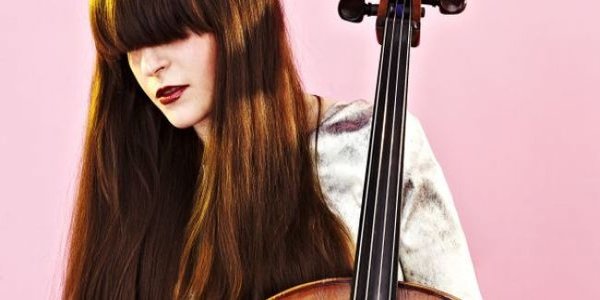Introducing… Abi Wade
Under the Introducing microscope this week is avant-pop cellist Abi Wade
 Here at Bearded we aim to shed light on acts who don't necessarily have giant labels or muscular budgets waving banners behind them. This Introducing series will focus on artists who we think are great, regardless of how much hype surrounds them or their origin story.
Here at Bearded we aim to shed light on acts who don't necessarily have giant labels or muscular budgets waving banners behind them. This Introducing series will focus on artists who we think are great, regardless of how much hype surrounds them or their origin story. A critic once described Abi Wade as a “psycho cellist” but the only craziness would be failing to appreciate one of the country's most distinctive new performers. Her unique way with a cello is just part of it. Add a voice that ranges from throaty depths to Florence-y highs, plus songs that are as memorable lyrically as musically.
So what does Wade do with her cello then? In addition to deft bowing and pizzicato effects, she make her instrument a percussive tool using foot pedals, drumsticks and the bow to tap, thump and judder her way around its strings and body. Anyone's who seen what double bassist Barry Guy does with his instrument will know the amazing effects possible.
Release-wise we've had a slowly growing roster of tantalising singles and EPs, kicking off with the moody slow-grind debut single Boxer. The bluesy Heavy Heart and throwaway sprightly sneer of Faker made up a potent double A-side follow-up. Then there's the fantastic 4-track EP and Blood and Air featuring the bittersweet poppy crafting of Stability, the heavy-bowing and spat-out lyrics of Perfect Form, Hope's PJ Harvey-esque slow blues judder, and deceptively sweet-and-swooping Green Youth Great Plans with its “bones, bones, bones” refrain.
She's toured with English folk maestro Patrick Wolf and ethereal Californian outfit Other Lives, played hip festivals like End of The Road, The Great Escape and Wilderness, and had music on TV soundtracks. So now you've had some background, let's hear from Abi:
Bearded: Did you first take up the cello to play classical music, and when did you begin to see its wider potential?
AW: I took up the cello at primary school. I had the option to play cello, violin or flute, and I thought the cello looked the most impressive! I already played the piano and learnt to play classical music on both instruments, as well as filling little notebooks with songs and melodies.
However, it wasn't until university that I really began to incorporate the cello into my compositions. I was inspired by artists like Joanna Newsom who were using traditionally 'classical' instruments in their work. I was also studying artists like Laurie Anderson - and I loved Bauhaus and Minimalism, particularly Erik Satie.
It was this world that inspired me to look at the cello in a new way. With John Cage's 'prepared piano' in my head, I would run out to hardware stores to collect objects that I thought might create new and interesting effects. I scavenged the internet for new and old cello technique books, and then started to create my own!
On your songs so far you've used both lush orchestras and sparse field recordings. Do you see your music style going towards the lusher or sparser side of things?
Can I say both! The EP (and Blood and Air) is certainly bigger arrangement-wise than anything I have done before, but there is always a drive to try something new. I've really juggled around the way I work over the last year.
Introducing the music arrangement program Ableton into my world has meant I can do a lot more live, I've introduced synths and bass and I have been busy getting the live set ready. It's a journey - you head off in one direction and sometimes you end up somewhere you never expected to be.
If instruments can be said to have a 'character' the cello is often seen as sad/melancholic. Is there a character you'd ascribe to your cello playing?
Sometimes I think I sound like a broken record here but... they do say the cello as an instrument is the most similar in tone and range to the human voice. There is certainly an emotive and almost human connection that people feel when they listen to it.
Maybe my cello playing has a bit of a split personality: classical / avant-garde / popular music. Sounds a bit like Freud's Super ego / Id / Ego - that works with the whole human analogy!
You get compared to a diverse range of other women performers: Kate Bush, Joanne Newsom and Florence Welch. Do you hate those kind of comparisons?
AW: No, I don't hate the comparisons at all. I think people liken elements of my performance to these artists, not the act as a whole. They're all very strong female artists in their own right, which is great - I think that's definitely something to aspire to.
Photos by Kenny McCracken





 All Content RSS Feed
All Content RSS Feed
Follow Bearded on...